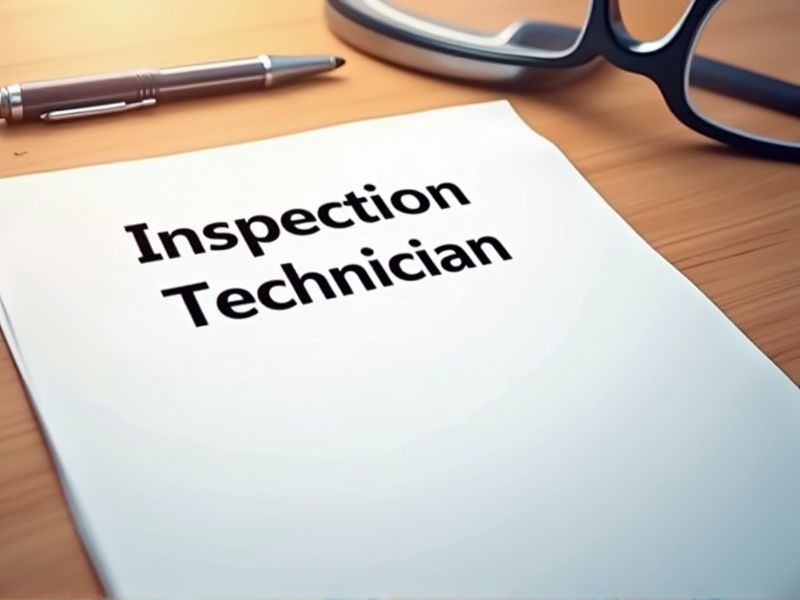
Inspection Technicians are responsible for evaluating equipment and structures, ensuring they meet industry standards and safety regulations. Certain certifications provide technicians with the necessary skills and knowledge to accurately assess and report on various components. These credentials enhance their credibility and demonstrate their commitment to quality and safety. Key certifications for Inspection Technicians might include the following.
Certified Welding Inspector (CWI)
Certified Welding Inspectors (CWIs) play a pivotal role in ensuring welded structures meet industry standards, directly impacting safety and reliability. Their expertise reduces the likelihood of structural failures, saving companies from costly repairs or catastrophic events. CWIs bring standardized evaluation methods, fostering consistent and reliable quality control across projects. Their presence can lead to improved compliance with regulations, enhancing the reputation and credibility of organizations involved.
ASNT NDT Level II - Ultrasonic Testing Certification
Holding the ASNT NDT Level II - Ultrasonic Testing Certification ensures an inspection technician has verified competencies in using ultrasonic methods. The certification validates their ability to detect and interpret defects, which is critical in maintaining safety and compliance in industries such as aerospace and construction. Technicians with this certification are trusted to perform inspections independently, reducing the likelihood of costly errors or equipment failures. Having this credential often provides better job opportunities and industry recognition, which can lead to career advancement.
ASNT NDT Level II - Magnetic Particle Testing Certification
The ASNT NDT Level II - Magnetic Particle Testing Certification is crucial because it validates an inspection technician's ability to accurately identify surface and slightly subsurface discontinuities in ferromagnetic materials. This certification ensures standardized testing procedures are followed, reducing the likelihood of oversight in critical inspections. With this credential, technicians demonstrate proficiency, enhancing trust and safety in industries like aerospace and manufacturing. Holding the certification often leads to improved job opportunities and career progression due to the technician's proven skill set and expertise.
ASNT NDT Level II - Liquid Penetrant Testing Certification
An ASNT NDT Level II Liquid Penetrant Testing Certification is crucial as it ensures the technician possesses the required expertise to detect surface defects in materials accurately. This certification validates the technician's proficiency in applying and interpreting liquid penetrant tests, enhancing the reliability of inspections. Obtaining this certification helps meet industry standards, thereby reducing the risk of undetected flaws in critical components. It also signifies a commitment to safety and quality, which is essential in maintaining trust with clients and regulatory bodies.
ASME Boiler & Pressure Vessel Inspector Certification
ASME Boiler & Pressure Vessel Inspector Certification ensures technicians have a deep understanding of safety and design standards critical for assessing pressure vessels. This certification improves accuracy in inspections, which helps prevent potentially catastrophic failures. By having certified inspectors, companies can enhance their credibility and comply with regulatory requirements. It also fosters professional development and career advancement by proving a technician's specialized knowledge and competence.
International Code Council (ICC) Building Inspector Certification
Obtaining the International Code Council (ICC) Building Inspector Certification ensures that an Inspection Technician has the necessary knowledge of building codes and standards, which leads to more accurate and reliable inspections. Knowledge validated by this certification directly supports consistent application of code requirements, reducing potential risks and improving safety in construction projects. Employers often require certification as it demonstrates a technician's commitment to maintaining industry standards and provides reassurance of their competency. The certification enhances the technician's credibility and employability, often resulting in better job opportunities and career advancement.
Certified Quality Inspector (CQI)
Certified Quality Inspectors (CQIs) possess verified expertise, leading to higher accuracy in inspections. Their standardized training allows for consistent application of quality benchmarks across projects. With CQI credentials, inspection technicians often improve efficiency by identifying defects earlier in the production process. CQI certification can enhance an organization's credibility with clients, promoting increased trust and business opportunities.
ASNT Fundamentals of Nondestructive Testing Certification
Having the ASNT Fundamentals of Nondestructive Testing Certification validates an inspection technician's knowledge and skill set in assessing materials and systems without causing damage. The certification also boosts credibility and trust among employers and clients, leading to increased job opportunities and career advancement. It ensures that the technician adheres to standardized practices and safety protocols, reducing the risk of errors in the inspection process. Companies prefer certified technicians to minimize liability and maintain high-quality control standards within their operations.
NACE Coating Inspector Certification
The NACE Coating Inspector Certification is essential for inspection technicians because it provides a standardized framework for evaluating coatings, ensuring consistent quality across different projects. This certification signifies a technician's proficiency in identifying coating defects, which can prevent costly repairs and ensure structural integrity. The training involved equips inspectors with the latest industry knowledge and techniques, reducing the risk of premature coating failures. Certified inspectors gain credibility, giving clients confidence in their expertise, which can lead to increased job opportunities and career advancement.
ISO 9001 Lead Auditor Certification
ISO 9001 Lead Auditor Certification equips an inspection technician with a deep understanding of quality management principles, enhancing their ability to conduct thorough assessments. This certification ensures the technician can effectively identify areas of non-compliance, leading to improved operational standards. By having this certification, the technician gains credibility and trust, which is essential for building client confidence. It also provides the skills necessary to improve processes, which can contribute to organizational efficiency and productivity.
Summary
When you obtain certifications as an Inspection Technician, you enhance your expertise and credibility in the field. This often results in increased job opportunities and potentially higher income. Employers may perceive you as more skilled and invest in your career development. Certified technicians are also likely to experience greater job satisfaction due to a sense of achievement and professional recognition.
